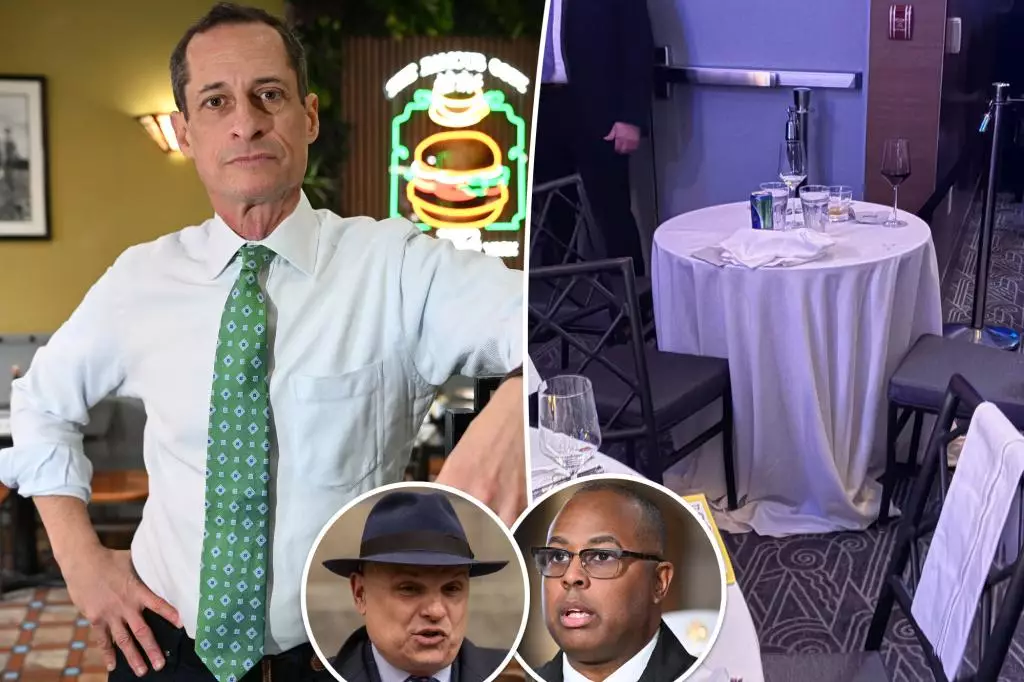Every year, the Inner Circle dinner marks a dazzling occasion where New York’s political and media elite gather to partake in a night of camaraderie, barbs, and lighthearted roasting. This year’s 101st Inner Circle dinner was no exception, but it took a turn for the hilariously awkward when disgraced former congressman Anthony Weiner found himself sidelined in more ways than one. The political gala, typically characterized by its grandeur, became a stage for unexpected drama that highlighted the complexities of political rehabilitation.
Weiner, a man familiar with the harsh glare of public scrutiny, was initially seated at a table meant to accommodate a larger group. However, his evening took a nosedive when he was abruptly relocated to what attendees dubbed “the kids’ table”—a small setup right at the heart of the room, awkwardly positioned in front of the stage. This lockstep with a juvenile seating arrangement seems an emblematic representation of Weiner’s current standing: a once-prominent figure reduced to the shadows of his past misfires. The incident served more than just as a minor mix-up; it illustrated the social hierarchies and subtle ostracism of the gala circuit, where reputation and perception are of utmost importance.
The Absurdity of Table Assignments
Sources disclosed that Weiner’s demotion to the “small Weiner table” elicited laughter and whispered comments among the gala guests. A source revealed that he had been enjoying the festivities before the abrupt switch, stating, “First off, Weiner was sitting [at a big table] then someone tapped him on the shoulder…” It appears that the dinner’s organizers misjudged the seating arrangements, an error not lost on the attendees who relished the irony.
Even amid the mockery, Weiner attempted to downplay the event. His email commentary to Page Six emphasized a lack of awareness about any table snafu, claiming that he was merely a guest of his close friend, renowned attorney Arthur Aidala. However, it’s hard to ignore the theatricality of the moment; for someone wrestling with the ghosts of their public image, being placed at that “kid’s table” could seem like a karmic joke.
The Political Comeback and Enduring Bonds
Weiner’s presence at the gala took on a different shade when he was revealed to be in the midst of a campaign for City Council. His aspirations to re-enter the political arena have been met with a mixed bag of skepticism and curiosity from the public. In an environment where political fortunes fluctuate like the stock market, Weiner’s decision to put himself back under public scrutiny reflects a mix of ambition and, perhaps, a yearning for redemption.
Aidala, who has a long-standing history with Weiner spanning decades, attests to the enduring friendship and support system that exists despite Weiner’s checkered past. He expressed loyalty to Weiner, stating, “Before he was a client he was a friend.” Aidala acknowledges the challenges that Weiner faces in his bid for office but underscores the importance of second chances, emphasizing that friendship can withstand the turmoil of politics.
Meanwhile, as the Inner Circle accommodates reflections on political figures from various walks of life, including jabs at Mayor Eric Adams and former Governor Andrew Cuomo, Weiner’s presence at the event raises interesting questions about the nature of public redemption and the tolerance landscape of political follies.
The Gala: A Microcosm of Political Hierarchy
The Inner Circle gala serves as a microcosm of the larger political framework, where power dynamics and relationships are constantly at play. It is a space where political prowess is tested not only by words and actions but by physical presence and social hierarchy. In the midst of laughter, provocations, and allegiances, one cannot help but perceive how the evening reflects larger societal narratives about belonging—specifically, who is welcomed at the proverbial adult table and who is relegated to the sidelines.
As evening unfolded, the raw truth remained that Weiner, whether by choice or accident, found himself navigating a familiar yet uncomfortable territory. It’s a reminder of how swiftly fortunes change in the world of political performance, where one moment you might be the toast of the town and the next, the punchline of a joke. For figures like Weiner, the stakes are high, and every public appearance becomes a line to walk carefully, balancing on the edge of humor, inquiry, and redemption.
The stories of personal and professional missteps, ensconced within the laughter of the Inner Circle, highlight a community that is not just capable of embracing the ludicrous but is also a testament to the resilience required to survive in the frenetic world of politics. How this will play out in Weiner’s ambitions remains to be seen, but for one night, the gala became a backdrop for his ongoing narrative—a saga filled with hilarity, embarrassment, and the persistent desire for reinvention.

